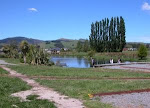Local body elections are coming up this year in October.
Every three years, we get to vote in the people who oversee the Christchurch
City Council and the local Community Board, Environment Canterbury and the
District Health Board.
Local Government is given its responsibilities in the Local
Government Act 2002. These are to enable democratic local decision-making and
action by, and on behalf of, communities; and
to meet the current and future needs of
communities for
- good-quality local infrastructure, ie water
supply, drainage, sewerage and roads,
- local public services (things like libraries,
community activities), and
- to regulate things like subdivisions or housing
development, building activities, businesses etc.
Many of these activities are also directed by central
government through legislation such as the Resource Management Act, the
Reserves Act
Regional councils,
like Environment Canterbury, are primarily concerned with environmental
resource management, flood control, air and water quality, pest control, and,
in specific cases, public transport, regional parks and bulk water supply.
 Territorial
authorities, like our City Council
Territorial
authorities, like our City Council, are responsible for a wide range of
local services including roads, water reticulation, sewerage and refuse
collection, libraries, parks, recreation services, local regulations, community
and economic development, and town planning.
In Christchurch, we elect a council and a community
board. Community boards, as their name implies, have a more local focus
whilst City Councillors keep an eye on issues across the whole city. For most local issues, the place to start
contacting the Council is through the community board. Community boards allocate some funding and
make decisions on some kinds of local facilities. They also make recommendations to Council on
decisions being taken by them.
District Health Board
These elections also allow us to vote for people to sit on
our
District Health Board which allocates health funding.
Health Boards can also impact on you because
they have some influence as to the priorities of health funding in Canterbury.
You can have a say in how your community is run by voting in
the local government elections.
Voting
is by post.
Papers will be sent out to
voters in late September or early October and have to be into the returning
officer by 12
th October.
To
find out more visit
the Local Government NZ website
Who will you be
voting for?
1)
One person to represent you on the Christchurch City
Council.
Christchurch
is divided in to 14 wards and a City Councillor represents one ward.
2)
Two people to represent you on a community
board.
There are 6 community boards around the City. Each is made up of either two or three
wards. Each ward has two community board
members to represent them in addition to the Councillor for that ward.
3)
Two people to
represent you on the Regional Council.
The Canterbury Regional Council is to have a full
democratic election for the first time in 9 years. From 2008 to 2016, Environment Canterbury has
been run by a council appointed by the government. In 2016 about half of the council was elected
democratically. In 2019 the Council will
return to normal and be fully democratically elected.
Canterbury has been divided into 7 wards – 4 in
Christchurch City: Central, South, West and North East. And three other wards cover the rural areas
to the north and south of the City. You can download maps of where these are from this page.
4) Seven of 11 people on the District Health
Board.
Four of the people on the DHB are appointed. We vote for the other seven.
Who can stand for
election to Local Government?
All New Zealand
Citizens can stand for election to any council or community board. Nominations close in July. Find out more at www.lgnz.co.nz
How do you find out about local
government candidates?
With a little bit of effort, you can find out quite a bit about your local candidates. The easiest way to find information online (try googling them, for example). Here are a few more places where you can find out more.
- Keep an eye out for information about them in local media, or on
Billboards or in your letterbox.
- The local news media will run stories about candidates and their
campaigns during the elections.
- Community newsletters and Facebook groups can also be a way to find out
about candidates. Here in Halswell, we
will invite candidates to put information up on this community blog and we will
link to those profiles on Facebook and through this newsletter.
- Many candidates have social media profiles and blogs or websites which
can help you learn about them and their values.
- Residents associations and other community groups often run public
meetings where candidates can present their views and answer questions from
electors.
- Most candidates will provide a ‘candidate profile statement’ of 150
words to the electoral officer with their nomination, and this profile will be
included in the information sent to voters.
This information might also be on the local council’s website after Mid August when nominations have closed.
- Another way to learn about
people is to ask a few people who you know and trust what they know and who
they will vote for and why. This does
not mean you should vote the same way they do (although you might want to). Asking the question and hearing the answer can help
you think about your own views.
- Look out for candidates at
local events and activities and ask them questions.
- As it gets closer to the elections, many organisations also send questions to candidates and publicise their answers. Look out of these - they an help.






